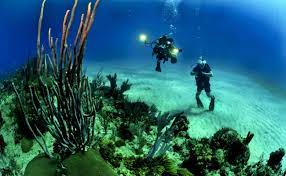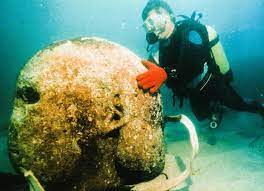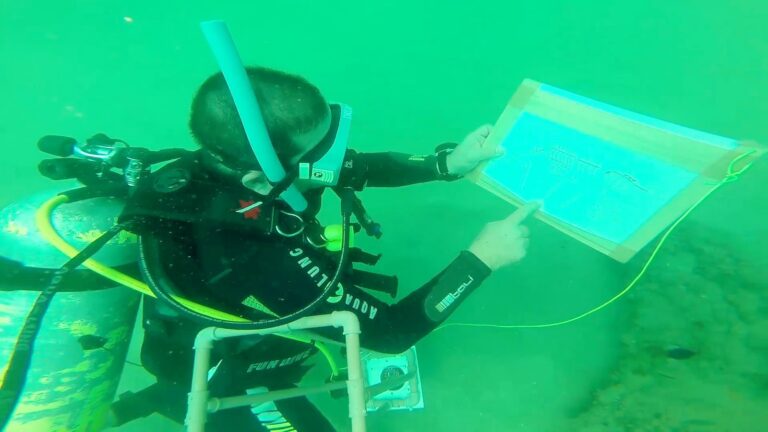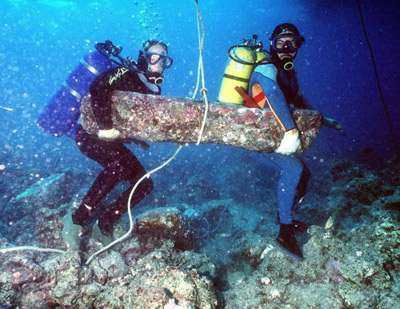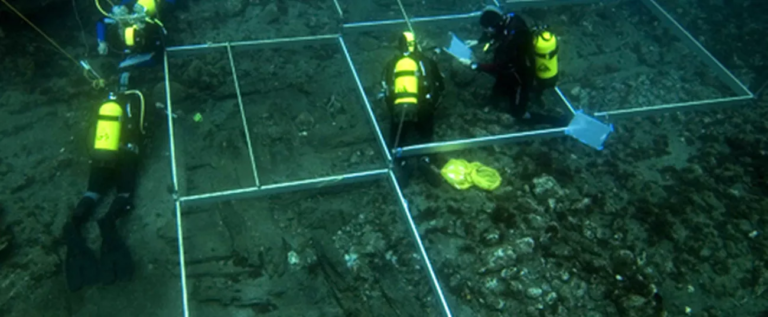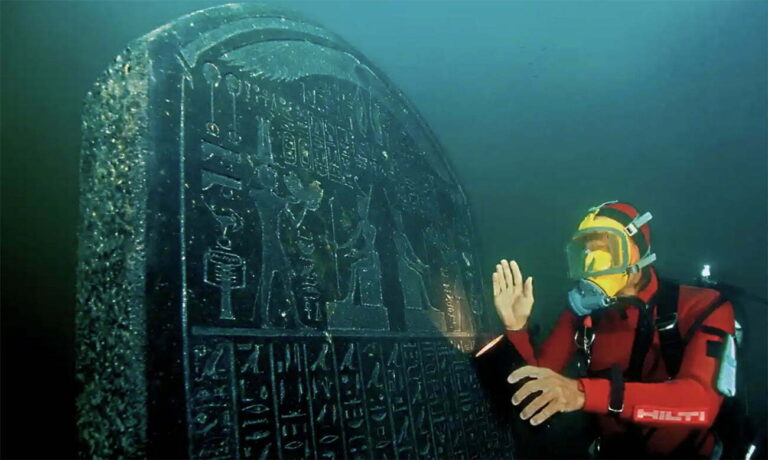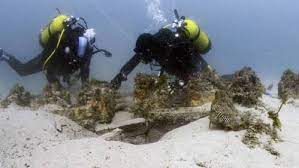The Perfect Fusion: Recreational Diving and Underwater Archaeology
Recreational diving and underwater archaeology are two fascinating fields that have been gaining increasing interest and importance in recent years. Recreational diving allows individuals to explore the mesmerizing underwater world, while underwater archaeology enables us to unlock the secrets of the past by studying and preserving submerged cultural heritage.
Recreational diving has become a popular activity, attracting people from all over the world who are captivated by the allure of the underwater realm. From scuba diving to snorkeling, these forms of recreational diving offer individuals the opportunity to immerse themselves in a world that is otherwise inaccessible. The tourism industry has also recognized the potential of recreational diving as a major attraction, further highlighting its significance.
On the other hand, underwater archaeology focuses on uncovering and studying the remains of human history that are submerged beneath the water’s surface. With the rising sea levels and the countless shipwrecks and ancient ruins that lie beneath the depths, underwater archaeology has become a vital field for understanding our past. Through careful research, excavation, and preservation techniques, underwater archaeologists bring to light the stories and artifacts that have been hidden underwater for centuries.
The purpose of this article is to showcase the perfect fusion between recreational diving and underwater archaeology. By exploring their shared interests and overlapping objectives, we can understand how these two fields can work together symbiotically. This collaboration between recreational divers and underwater archaeologists not only benefits both parties but also has a positive impact on research, preservation, and public engagement. Let us delve deeper into this convergence to uncover the potential and possibilities it holds for the exploration of underwater cultural heritage.
Table of Contents
Recreational Diving: Exploring the Underwater World
Recreational diving is a thrilling and enchanting activity that allows individuals to explore the mesmerizing underwater world. With its allure and popularity, more and more people are taking up this exciting hobby. The underwater world offers a myriad of wonders, from vibrant coral reefs teeming with marine life to sunken shipwrecks holding invaluable historical treasures.
There are different types of recreational diving, each offering a unique experience. Scuba diving involves exploring the depths using an underwater breathing apparatus, providing divers with the freedom to stay submerged for an extended period. On the other hand, snorkeling allows individuals to explore the surface of the water using a mask and snorkel, observing the mesmerizing marine life below.
The popularity of recreational diving extends beyond individual enjoyment. It also plays a crucial role in promoting tourism in coastal areas. Divers from around the world travel to renowned dive destinations, attracted by the opportunity to immerse themselves in the underwater wonders. This influx of tourists boosts the local economy, supporting businesses such as dive shops, accommodations, and restaurants. Additionally, a thriving diving industry often leads to the conservation and protection of marine ecosystems, ensuring their preservation for future generations to enjoy.
So, whether diving into the depths with scuba gear or gliding along the surface with a snorkel, recreational diving provides individuals with an extraordinary opportunity to connect with the underwater world. It not only offers personal fulfillment but also contributes to the tourism industry, environmental conservation, and the appreciation of our invaluable marine heritage.
Underwater Archaeology: Unlocking the Secrets of the Past
Underwater archaeology is a fascinating field that focuses on the exploration and study of submerged cultural heritage. It involves the investigation and preservation of archaeological sites and artifacts that lie beneath the surface of oceans, rivers, and lakes. The significance of this field cannot be overstated, as it provides valuable insights into our human history and unlocks the secrets of the past.
Underwater archaeologists employ various techniques and methods to study and preserve submerged cultural heritage. They utilize specialized diving equipment and technologies to reach and document underwater sites. Through careful excavation and meticulous documentation, they retrieve artifacts and analyze their contexts to gain a deeper understanding of ancient civilizations and their interactions with the aquatic environment.
However, underwater archaeology is not without its challenges. The underwater environment presents unique obstacles, such as limited visibility, harsh conditions, and potential damage to fragile artifacts. Preservation of underwater cultural heritage is also a complex task, as exposure to oxygen and changes in water salinity can lead to the deterioration of artifacts. Effective conservation strategies and techniques need to be employed to ensure their long-term survival.
Despite these challenges, underwater archaeology offers tremendous opportunities for uncovering hidden histories and expanding our knowledge of the past. It allows us to fill in gaps in our understanding of ancient civilizations and their relationship with water. The exploration of underwater archaeological sites not only contributes to our historical knowledge but also promotes cultural heritage tourism and fosters a sense of appreciation and respect for our shared human history.
In conclusion, underwater archaeology plays a crucial role in unlocking the secrets of the past and preserving our cultural heritage. By studying and excavating subaquatic sites, underwater archaeologists are able to shed light on ancient civilizations and their interactions with water. However, this field does face unique challenges, from the underwater environment to the preservation of artifacts. With proper training, regulations, and collaboration with recreational divers, underwater archaeology can continue to thrive and contribute to our understanding of the past.
The Convergence: Overlapping Interests and Objectives
Recreational divers and underwater archaeologists share a passion for exploring the depths of the oceans and uncovering the secrets that lie beneath. Both groups are driven by a curiosity to understand and preserve the underwater world, albeit with different approaches and objectives.
The symbiotic relationship between recreational divers and the field of underwater archaeology is evident. Recreational divers serve as the eyes and ears for archaeologists, providing valuable information about submerged sites and artifacts. Their exploration of underwater environments often leads to the discovery of previously undiscovered sites or artifacts, acting as a catalyst for further scientific investigation.
Collaborative projects between recreational divers and underwater archaeologists have yielded remarkable discoveries. In one instance, a group of recreational divers stumbled upon a shipwreck while exploring a popular diving spot. Recognizing the historical significance of the find, they alerted underwater archaeologists, who were able to conduct a thorough excavation and learn more about the ship’s history.
Another example of successful collaboration between recreational divers and archaeologists is the mapping and documentation of underwater caves. Recreational divers, equipped with advanced diving gear and photography equipment, have contributed to creating detailed maps of these submerged caves. This information is invaluable to archaeologists, as it helps them understand the cultural significance and historical context of these hidden wonders.
The fusion of recreational diving and underwater archaeology not only benefits researchers but also the general public. By engaging recreational divers in archaeological projects, the public’s awareness and appreciation for underwater cultural heritage is heightened. This collaboration promotes a sense of stewardship and responsibility towards preserving these valuable resources for future generations.
As this merger continues to grow, it is important to recognize and address the potential challenges and ethical considerations. Proper training, regulations, and guidelines must be put in place to ensure the responsible exploration and preservation of underwater cultural heritage. By doing so, we can ensure the long-term sustainability and protection of these invaluable resources.
In conclusion, the convergence between recreational diving and underwater archaeology is a perfect fusion. Through their shared interests and objectives, recreational divers and underwater archaeologists are able to uncover the mysteries of the past and contribute to the preservation of underwater cultural heritage. Continued collaboration and support for both fields will not only enhance our understanding of history but also promote the importance of responsible exploration and preservation.
Benefits and Impacts
Recreational divers’ involvement in underwater archaeology projects brings numerous benefits and has a significant impact on both fields. Firstly, the expertise and skills of recreational divers can contribute greatly to the research and exploration of underwater cultural heritage. Their experience in navigating and exploring underwater environments allows them to assist underwater archaeologists in locating and documenting underwater sites.
Additionally, recreational divers can play a vital role in the preservation of submerged cultural heritage. Their involvement helps to raise awareness about the importance of protecting these sites, and they can assist in monitoring and reporting any signs of deterioration or looting. By actively engaging recreational divers in underwater archaeology, the chances of preserving and conserving submerged artifacts and structures are greatly increased.
Moreover, the collaboration between recreational divers and underwater archaeologists has a positive impact on public engagement and education. Through working together on projects, recreational divers gain a deeper understanding of the historical and cultural significance of the sites they explore. This, in turn, allows them to share their knowledge and experiences with others, raising awareness about underwater archaeology and fostering a greater appreciation for the importance of preserving our shared heritage.
Furthermore, this collaboration has reciprocal benefits for both recreational diving and underwater archaeology. Recreational divers gain a unique and enriching experience by participating in archaeological projects, deepening their appreciation for the underwater world and expanding their cultural horizons. On the other hand, underwater archaeologists benefit from the increased resources and manpower recreational divers bring, expanding their capacity to conduct research and make new discoveries.
In summary, the involvement of recreational divers in underwater archaeology projects provides numerous benefits and has a positive impact on both fields. From contributing to research and preservation efforts to educating the public about the significance of underwater cultural heritage, this fusion between recreational diving and underwater archaeology paves the way for exciting collaborations and a deeper understanding of the past.
Challenges and Future Directions
Addressing the potential challenges and ethical considerations of involving recreational divers in underwater archaeology is crucial for ensuring the integrity and preservation of submerged cultural heritage. One of the main challenges is providing proper training to recreational divers who wish to participate in archaeological projects. While recreational divers may have experience in exploring underwater environments, they often lack the expertise required for archaeological excavation and preservation techniques. It is essential to establish guidelines and regulations that prioritize the protection and conservation of archaeological sites, as well as the safety of both divers and artifacts.
Additionally, ethical considerations must be taken into account when involving recreational divers in underwater archaeology. For example, there is a need to address issues such as looting, unauthorized artifact collection, and damage to fragile archaeological materials. Implementing strong ethical standards and ensuring divers understand the importance of leaving artifacts in their original context will help prevent the loss of valuable historical information.
To overcome these challenges, collaboration between the diving and archaeological communities is vital. Training programs that focus on underwater archaeological techniques should be developed to provide recreational divers with the necessary skills and knowledge. This training should cover topics such as site documentation, artifact handling, and conservation principles.
In terms of future directions, increased collaboration and support between recreational divers and underwater archaeologists should be encouraged. This collaboration can take various forms, such as organized volunteer programs, joint research projects, and public outreach initiatives. By involving recreational divers in underwater archaeology in a responsible and well-regulated manner, we can maximize the potential for discovery and understanding of submerged cultural heritage. Only by working together can both fields continue to explore and unravel the secrets of the past hidden beneath the sea’s surface.
Conclusion
In conclusion, the fusion between recreational diving and underwater archaeology holds immense importance and potential for the exploration of underwater cultural heritage. It is a remarkable convergence of two fields that share a deep passion for the underwater world and a desire to unlock its secrets.
The mutual benefits of this merger are undeniable. Recreational divers bring their enthusiasm, expertise, and understanding of the underwater environment to the table. Their involvement in underwater archaeology projects allows them to contribute to research, preservation, and public engagement, creating a meaningful impact on the field.
At the same time, underwater archaeology offers recreational divers a unique opportunity to explore and understand the historical significance of the sites they visit. It adds an extra layer of excitement and purpose to their dives, enhancing their overall experience and satisfaction.
Encouraging continued collaboration and support for both fields is of utmost importance. It is through collaboration that we can achieve greater success in uncovering and preserving underwater cultural heritage. This can be done by fostering partnerships between recreational divers and underwater archaeologists, as well as promoting the training and education needed to ensure safe and responsible exploration.
In conclusion, the fusion of recreational diving and underwater archaeology has the power to revolutionize the exploration and study of underwater cultural heritage. It is a perfect combination of passion and expertise, and it is our duty to support and encourage the continued growth and collaboration between these two fields. Together, we can unlock the secrets of the past and ensure the preservation of these invaluable submerged treasures for future generations.

